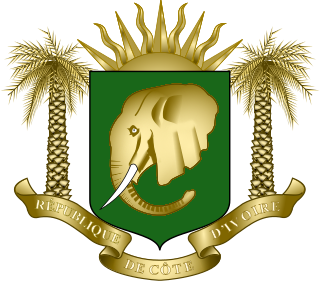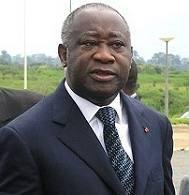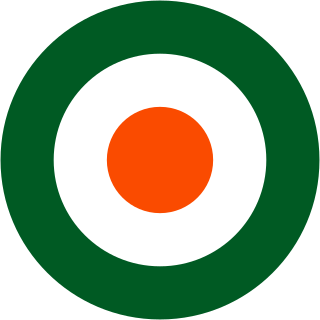
The Republican Forces of Côte d'Ivoire is the current name of the armed forces of Ivory Coast.

Ivory Coast or Côte d'Ivoire, officially the Republic of Côte d'Ivoire, is a country located on the south coast of West Africa. Ivory Coast's political capital is Yamoussoukro, while its economic capital and largest city is the port city of Abidjan. It borders Guinea and Liberia to the west, Burkina Faso and Mali to the north, Ghana to the east, and the Gulf of Guinea to the south.

Koudou Laurent Gbagbo is an Ivorian politician who was the President of Côte d'Ivoire from 2000 until his arrest in April 2011. A historian, Gbagbo was imprisoned in the early 1970s and again in the early 1990s, and he lived in exile in France during much of the 1980s as a result of his union activism. Gbagbo founded the Ivorian Popular Front (FPI) in 1982 and ran unsuccessfully for president against Félix Houphouët-Boigny at the start of multi-party politics in 1990. He won a seat in the National Assembly of Côte d'Ivoire in 1990.

Bouaké is the second-largest city in Ivory Coast, with a population of 536,189. It is the seat of three levels of subdivision—Vallée du Bandama District, Gbêkê Region, and Bouaké Department. The city is located in the central part of Ivory Coast about 50 kilometres (31 mi) northeast of Lake Kossou, the country's largest lake. It is approximately 350 kilometres (220 mi) north of Abidjan on the Abidjan-Niger Railway and about 100 kilometres (62 mi) northeast of Yamoussoukro, the capital of the country.

The First Ivorian Civil War was a conflict in the Ivory Coast that began in 2002. Although most of the fighting ended by late 2004, the country remained split in two, with a rebel-held Muslim north and a government-held Christian south. Hostility increased and raids on foreign troops and civilians rose. As of 2006, the region was tense, and many said the UN and the French military failed to calm the civil war.
International Christian Academy (ICA) was an American boarding school in Bouaké, Ivory Coast. It was established in 1962 as Ivory Coast Academy by the Conservative Baptist Foreign Mission Society and its main purpose was to provide a standard American education to the children of missionaries in West Africa. In 2002, it had some 160+ students from 13 nations in grades 1–12.

The United Nations Operation in Côte d'Ivoire(UNOCI)(French: Opération des Nations Unies en Côte d'Ivoire, ONUCI) was a peacekeeping mission whose objective was "to facilitate the implementation by the Ivorian parties of the peace agreement signed by them in January 2003". The two main Ivorian parties here are the Ivorian Government forces who control the south of the country, and the New Forces, who control the north. The UNOCI mission aims to control a "zone of confidence" across the centre of the country separating the two parties. The Head of Mission and Special Representative of the Secretary-General is Aïchatou Mindaoudou Souleymane from Niger. She has succeeded Bert Koenders from the Netherlands in 2013 who himself succeeded Choi Young-jin from South Korea in 2011. The mission officially ended on 30 June 2017.
The Congrès Panafricain des Jeunes et des Patriotes (COJEP), commonly known as Young Patriots, of Côte d'Ivoire is the name given to a youth movement supportive of the former President of Côte d'Ivoire, Laurent Gbagbo and his ruling Ivorian Popular Front (FPI) party. Its founder is Charles Blé Goudé.

Charles Blé Goudé is an Ivorian political leader, born at Guibéroua, in the centre west of the country. He is currently on trial at the International Criminal Court for crimes against humanity allegedly committed in Côte d'Ivoire during the presidency of Laurent Gbagbo.
The Roman Catholic Diocese of Yamoussoukro is a diocese located in the city of Yamoussoukro in the Ecclesiastical province of Bouaké in Côte d'Ivoire.
Opération Licorne was the name of the French Armed Forces's peacekeeping operation in support of the United Nations Operation in Côte d'Ivoire. The French forces have been stationed in the country since shortly after the outbreak of the Ivorian Civil War. The troops' main mission was to support the United Nations peacekeeping mission and to ensure the security of French and foreign nationals.

In 2004, an armed conflict took place between France and Côte d'Ivoire. On 6 November 2004, Ivorians launched an air attack on French peacekeepers in the northern part of Côte d'Ivoire who were stationed there as part of Operation Unicorn, the French military operation in support of the United Nations Operation in Côte d'Ivoire (UNOCI). French military forces subsequently clashed with Ivorian troops and government-loyal mobs, destroying the entire Ivorian Air Force. Those incidents were followed by massive anti-French protests in Côte d'Ivoire.

Presidential elections were held in Ivory Coast in 2010. The first round was held on 31 October, and a second round, in which President Laurent Gbagbo faced opposition leader Alassane Ouattara, was held on 28 November 2010. Originally scheduled to be held in 2005, the vote was delayed several times due to the Ivorian Civil War and difficulties involved in the organization and preparation of the elections. A peace agreement between the government and the former rebel New Forces was signed on 4 March 2007, and in late April 2009, it was announced that the elections would be held by 6 December 2009, and that the date would be announced shortly. On 15 May 2009, the date was announced to be 29 November 2009. On 11 November, the elections were postponed again due to delays in the electoral roll. It was announced on 3 December 2009 to be held in late February or early March 2010.

Abidjan is the economic capital of Ivory Coast and one of the most populous French-speaking cities in Africa. According to the 2014 census, Abidjan's population was 4.7 million, which is 20 percent of the overall population of the country, and this also makes it the sixth most populous city proper in Africa, after Lagos, Cairo, Kinshasa, Dar es Salaam, and Johannesburg. A cultural crossroads of West Africa, Abidjan is characterised by a high level of industrialisation and urbanisation.
Operation Autumn Return was a non-combatant evacuation operation of the United States armed forces conducted from September 22 to October 4, 2002, in Côte d'Ivoire.

The 2010–11 Ivorian crisis was a political crisis in Ivory Coast which began after Laurent Gbagbo, the President of Ivory Coast since 2000, was proclaimed the winner of the Ivorian election of 2010, the first election in the country in 10 years. The opposition candidate, Alassane Ouattara, and a number of countries, organisations and leaders worldwide claimed Ouattara had won the election. After months of attempted negotiation and sporadic violence, the crisis entered a decisive stage as Ouattara's forces began a military offensive in which they quickly gained control of most of the country and besieged key targets in Abidjan, the country's largest city. International organizations have reported numerous human rights violations, and the UN undertook its own military action with the stated objective to protect itself and civilians.

The Second Ivorian Civil War broke out in March 2011 when the crisis in Ivory Coast escalated into full-scale military conflict between forces loyal to Laurent Gbagbo, the President of Ivory Coast since 2000, and supporters of the internationally recognised president-elect Alassane Ouattara. After months of unsuccessful negotiations and sporadic violence between supporters of the two sides, the crisis entered a critical stage as Ouattara's forces seized control of most of the country with the help of the UNO, with Gbagbo entrenched in Abidjan, the country's largest city. International organizations have reported numerous instances of human rights violations by both sides, in particular in the city of Duékoué where Ouattara's forces killed hundreds of people. Overall casualties of the war are estimated around 3000. The UN and French forces took military action, with the stated objective to protect their forces and civilians. France's forces arrested Gbagbo at his residence on 11 April 2011.
The following lists events that happened during 2011 in Ivory Coast.

The Air Force of the Ivory Coast is one of the four main branches of the Armed Forces of the Republic of Ivory Coast.




















